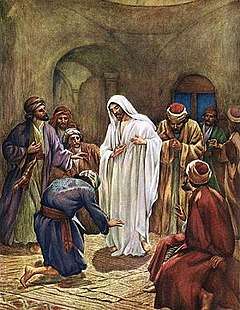John 20:21
John 20:21 is the twenty-first verse of the twentieth chapter of the Gospel of John in the New Testament. It records Jesus' commission to the disciples during his first appearance after the resurrection.
| John 20:21 | |
|---|---|
← 20:20 20:22 → | |
 Jesus appears to his disciples after he has risen. In "The life of Jesus of Nazareth: eighty pictures" (Eyre & Spottiswoode, 1906). | |
| Book | Gospel of John |
| Christian Bible part | New Testament |
Content
The original Koine Greek, according to the Textus Receptus, reads:[1]
- εἶπεν οὖν αὐτοῖς ὁ Ἰησοῦς πάλιν Εἰρήνη ὑμῖν· καθὼς ἀπέσταλκέν με ὁ πατήρ κἀγὼ πέμπω ὑμᾶς
In the King James Version of the Bible it is translated as:
- Then said Jesus to them again, Peace be unto you: as my Father hath sent me, even so send I you.
The modern World English Bible translates the passage as:
- Jesus therefore said to them again, "Peace be to you. As the Father has sent me, even so I send you."
For a collection of other versions see BibleHub John 20:21
Analysis
The account of Jesus' first appearance in the Gospel of John (20:19-23; 21:13) shows similarity to the account in the Gospel of Luke (24:36-49), that it happened in Jerusalem in the evening of his resurrection from the dead.[2]
The words Peace be with you (Ancient Greek: Εἰρήνη ὑμῖν, Eirēnē hymin[1]) is a common traditional Jewish greeting[3] still in use today (shalom alekem or שלום לכם shalom lekom;[1] cf. 1 Samuel 25:6[4]),[5] also spoken by Jesus in John 20:19 and 26.[4]
The statement "as the Father has sent me, even so I send you" indicates that the missionary work of the disciples is dependent on the mission of Jesus, the Son of God.[6] The repetition of the words of peace gives the emphasis on the importance of this commission.[7] Each gospel records a commission from Jesus after resurrection.[5]
References
- Greek Text Analysis: John 20:21. Biblehub
- Kieffer 2007, p. 997.
- Coogan, Michael David (2007). Coogan, Michael David; Brettler, Marc Zvi; Newsom, Carol Ann; Perkins, Pheme (eds.). The New Oxford Annotated Bible with the Apocryphal/Deuterocanonical Books: New Revised Standard Version, Issue 48 (Augmented 3rd ed.). Oxford University Press. p. 180 New Testament. ISBN 9780195288810.
- Köstenberger, Andreas J. (2004). John. Baker Exegetical Commentary on the New Testament. Volume 4 (illustrated ed.). Baker Academic. p. 572. ISBN 9780801026447.
- Carson, D. A. (1991). The Gospel According to John. Pillar New Testament commentary (reprint ed.). Wm. B. Eerdmans Publishing. p. 647. ISBN 9780851117492.
- Kieffer 2007, pp. 997–998.
- Guthrie 1994, p. 1064.
Sources
- Guthrie, Donald (1994). "John". In Carson, D. A.; France, R. T.; Motyer, J. A.; Wenham, G. J. (eds.). New Bible Commentary: 21st Century Edition (4, illustrated, reprint, revised ed.). Inter-Varsity Press. pp. 1021–1065. ISBN 9780851106489.
- Kieffer, René (2007). "60. John". In Barton, John; Muddiman, John (eds.). The Oxford Bible Commentary (first (paperback) ed.). Oxford University Press. pp. 960–1000. ISBN 978-0199277186. Retrieved February 6, 2019.